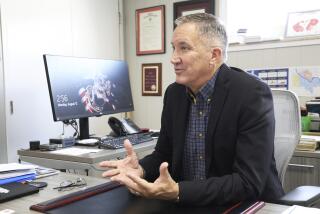Kansas’ evolution debate just keeps evolving
The great Kansas debate over teaching evolution continues to, well, evolve.
Consider Jack Wu, candidate for the Kansas state Board of Education. Perhaps the most relevant qualification on his bio is that he attends the Westboro Baptist Church. That’s the one that stages protests at soldiers’ funerals, saying God is punishing the U.S. for homosexuality.
“The current public educational system in Kansas and the United States is preparing its students to be liars, crooks, thieves, murderers and perverts,” he says on a statement on his campaign site.
He explains: “Evolution is false science! God made the heaven and the earth and created humans from the dust of the earth! The very bad teachers that teach that men descended from apes via evolution need to have their teaching licenses revoked.” (Evolutionists would probably agree: They think that humans and apes descended from a mutual ancestor, not from each other.)
All this is just a way of saying that the evolution debate once again is rearing its head as Kansas considers new science standards that would firmly entrench evolution as a core scientific principle.
Kansas is taking part in the national Next Generation Science Standards project, an attempt to align states’ education standards. The idea is to keep American kids globally competitive.
Once the Next Generation Science Standards are finished by the end of this year, it’ll be time for Kansas to review its own science standards. The state’s current education board members would be expected to adopt the national standards they are helping to draft. For some creationists, that makes November’s upcoming election for half the seats on the 10-member board huge.
“It’s not a bunch of Kansas crazies that has brought this up,” said Kenneth Willard, one state education board member who questions teaching evolution, according to the Lawrence Journal-World. “It’s broader.”
Yet the debate has lost some of its vigor since the 1999-2007 years, when a revolving-door board of creationists and evolutionists overturned the state’s education standards five times, including one 1999 vote that scrubbed most curricular references to evolution and another 2005 vote that challenged evolution by trying to redefine the discipline of science itself.
The board now safely sits in the hands of members in favor of teaching evolution as a core science standard. Opponents have internalized the “what’s-the-matter-with-Kansas?” mockery once captured by the Onion headline “Kansas Outlaws Practice of Evolution.”
“Anybody who deigns to take a questioning position regarding anything to do with evolution is pretty well named to be a crackpot or a kook of some sort,” Willard said at a recent board meeting, according to the Associated Press, as he walked back his own criticism of evolution education.
Creationist advocates outside of Kansas, such as Answers in Genesis in Kentucky, have distanced themselves from the most strident calls to ban teaching evolution.
“Answers in Genesis opposes efforts to remove evolution teaching from schools,” Mark Looy, co-founder and chief communications officer for Answers in Genesis and the Kentucky-based Creation Museum, told The Christian Post. “It is a major worldview that affects so much of society, and thus it needs to be studied.”
Add to that list the Institute for Creation Research.
“Teachers who don’t believe the Bible shouldn’t be forced to teach something they don’t believe,” Lawrence Ford, director of communications for the Institute for Creation Research, told the Christian Post.
Both organizations supported standards that would allow students to critically challenge evolution, however, so expect the debate to go on — maybe just more gently.
That’s fine with Brian Cole, a Sabetha High School physics and chemistry teacher who believes God created the world. Cole told the Associated Press that he wants the state to keep its current evolution-friendly standards.
“It’s not good for our teachers — it’s not good for our students — to have our standards be a pendulum,” he said.
More to Read
Sign up for Essential California
The most important California stories and recommendations in your inbox every morning.
You may occasionally receive promotional content from the Los Angeles Times.










